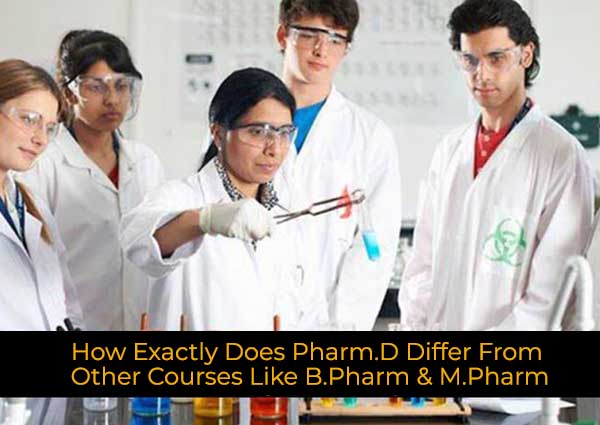How Exactly Does Pharm.D Differ From Other Courses Like B.Pharm & M.Pharm
The Bachelor of Pharmacy (B.Pharm. or B-Pharm) degree as well as Diploma of Pharmacy (D.Pharm. or D-Pharm) are most common programmes of pharmacology. The degree of B.Pharm. must be accredited by the AICTE (All Indian Council of Technical Education) or the Pharmacy Council of India (PCI). The bachelor’s course is actually a programme that is of 4 year, while on the other hand the diploma course is in fact a program that lasts 2-year. In addition, both need a six-month internship.
Pharm.D
The Pharma.D short for Doctor of Pharmacy course was first introduced in India by PCI only in the year 2008. The course duration of Pharm.D is about 6 years (5 years of study+1 year of internship or residency). It is a post-graduate (PG) qualification and therefore the graduates of this course can register directly for Ph.D. All candidates being awarded the Pharm.D degree are completely eligible to use the “Dr.” prefix before their name and hence the same will reflect on the certicate that will be issued to them by their PCI-approved university or institute.
Eligibility to join a Pharm.D course:
You must be a minimum of 17 years old and you must have pass any one of the given below exam:
(1) 10+2 with physics, chemistry and mathematics/biology
(2) Completed the course D.Pharm from a PCI-approved institution or university
(3) Any other sort of qualification approved by PCI that’s quite equivalent to above two mentioned qualifications
HOW EXACTLY DOES PHARM.D DIFFER FROM OTHER COURSES LIKE B.Pharm AND M.Pharm?
Pharm.D course differs quite a bit from regular pharmacy courses like B. Pharm and M. Pharm. The primary difference being that Pharm.D is clinically oriented, which is, patient specific. In addition, students are trained to counsel patients as well as inform them about the medicine/ drug dose, method and time. The course completely focuses on the mechanism of a drug’s actions, it’s side effects and adverse drug reactions on the body. Moreover, it also focuses on the main causes for the looks of the disease, and its most possible complications that can occur if left untreated. Furthermore, Pharm.D also focuses on the life-style changes that a patient can actually implement in order to improve health. Generally, Pharm.D students get the designation of “clinical pharmacist”.
On the other hand, B. Pharm and M. Pharm courses are rather industry oriented. You get to learn a lot about the actual formulation of the drug, study various different sources of drugs, their molecular structure, methods to synthesize/ manufacture drugs, pharmacological actions of the drugs, and so on so forth.
Pharm.D. (Post Baccalaureate)
The duration of the Pharm.D. (Post Baccalaureate) (Doctor of Pharmacy) is about 3 years ( that include 2 years of classroom studies+1 year of internship). So, if you wish to pursue this course, you actually need to be a B.Pharm from any PCI-approved institute or university. In the end you can say that this would be just like getting a lateral entry into the 4th year of a Pharm.D program by a B.Pharm graduate.

